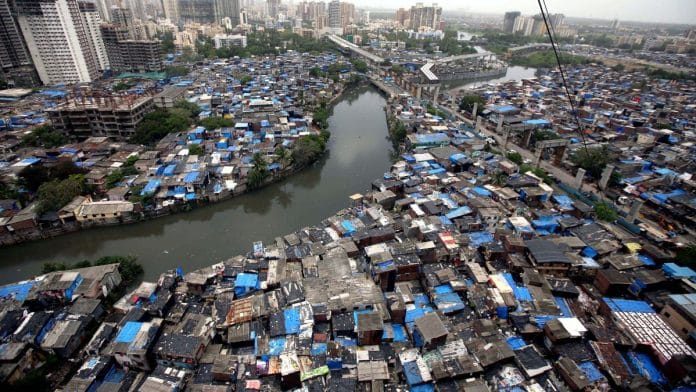New Delhi: In a rare, but significant ruling, the Supreme Court has asked the Bombay High Court to conduct a performance audit of the Maharashtra Slum Areas (Improvement, Clearance and Redevelopment) Act, 1971, in view of high pendency of cases filed under the law that has virtually grid-locked the welfare legislation.
A bench of Justices P.S. Narasimha and Aravind Kumar underlined a list of problems arising out of the statutory scheme and policy framework, which, according to the bench, should have been reviewed by the state, considering more than 1,600 cases involving disputes are pending before the Bombay High Court. Pronounced Tuesday, the judgment was made public Wednesday evening.
Making a case for review of the legislation, the judges found that out of 1,612 matters, 135 cases are those that are more than 10 years old and that in the last 20 years, 4,488 cases have been filed and disposed of under the said law.
Though the Act is a beneficial legislation, intended to materialise the constitutional assurance of dignity of the individual by providing basic housing, so integral to human life, the propensity and the proclivity of the statute to generate litigation is worrisome, they said.
While writing about the “implied duty of the executive government” to assess the working of a statute, the judges said: “Reviewing and assessing the implementation of a statute is an integral part of the Rule of Law.”
“The Executive branch has a constitutional duty to ensure that the purpose and object of a statute is accomplished while implementing it. It has the additional duty to closely monitor the working of a statute and must have a continuous and a real time assessment of the impact that the statute is having,” said the bench, as it asked the Bombay HC chief justice to constitute a special bench that will on its own initiate proceedings to review the working of the 1971 Act.
SC said the HC would be at liberty to direct the government to constitute a committee for performance audit of the Act. But before doing so, it shall hear all the necessary stakeholders, intended beneficiaries and also take assistance from senior members of the Bar specialising in this area.
Meant to improve, clear and redevelop slum areas in the state, the 1971 slum rehabilitation law has provisions to ensure protection of those who face eviction on account of the development of the area.
The judgment was delivered on an appeal filed by Yash Developers who moved the Supreme Court against the Bombay High Court’s 2022 verdict that terminated the slum-development project granted in favour of the real-estate company.
Approved in 2003 the project involved development of a slum in Borivali area of Mumbai. Yash Developers was appointed by a co-operative Housing Society of slum dwellers having their hutments in the slum area. However, due to a prolonged delay of over two decades, the Apex Grievance Redressal Committee terminated the agreement on 4 August, 2021, which was later upheld by the Bombay HC.
The 43-page judgment not just terminated Yash Developers’ appeal, it also imposed a cost of Rs 1 lakh that would be paid to the Supreme Court Mediation and Conciliation Project Committee.
Authored by Justice Narasimha, the judgment delineated the role of both the executive and judiciary in the effective implementation of the law. It also red-flagged the working of the law and said the HC’s “exasperation” over the working of the Act is “understandable.”
If the executive is duty bound to audit the working of the law, then the judiciary has to perform the role of a facilitator of access to justice and effective functioning of constitutional bodies, the bench said. As a facilitator the “judiciary does not review executive and legislative actions, but only nudges and provides impetus to systemic reforms,” noted the judgment.
It, therefore, found merit in the HC’s concern over the problems related to the functioning of the law and called it genuine.
“It has been noticed that the statutory scheme is problematic with respect to: i) Identification and declaration of land as a slum. This problem involves an examination of the role of authorities in giving such recognition, insidious intervention of builders in the said process cast doubts on the independence and integrity in the decision-making process,” it said.
Also read: 7.4 lakh evicted in past 2 yrs, highest in 2023, shows report by housing rights body
‘Law intended to benefit the marginalised’
The scheme also involves identification of the slum dwellers, which as per the bench, is a “complicated process”. The court also found gaps in the provision under which a developer is selected to work on a development project. On its examination the bench said the decision to choose a developer can easily be manipulated.
Another area of the law that has led to increase in litigation is the apportionment of the slum land between redevelopment area and sale area. Developers seek to increase the proportion of sale area, leading to contestation.
Another provision found problematic by the court was the one under which there is an obligation on the part of the developer to provide transit accommodation for slum dwellers. Concerns were also raised in the judgment over functioning of the statutory authorities and effectiveness of statutory remedies.
“The Maharashtra law is intended to benefit the marginalised and the impoverished and it is not easy for the intended beneficiaries to carry their voice to the legislative branch for effective reform,” it said.
The executive, it said, has a constitutional duty to ensure that the purpose and object of a law is accomplished while implementing it and has additional duty to closely monitor the working of the law and must have a continuous and a real time assessment of the impact that the statute is having, it said.
(Edited by Zinnia Ray Chaudhuri)






